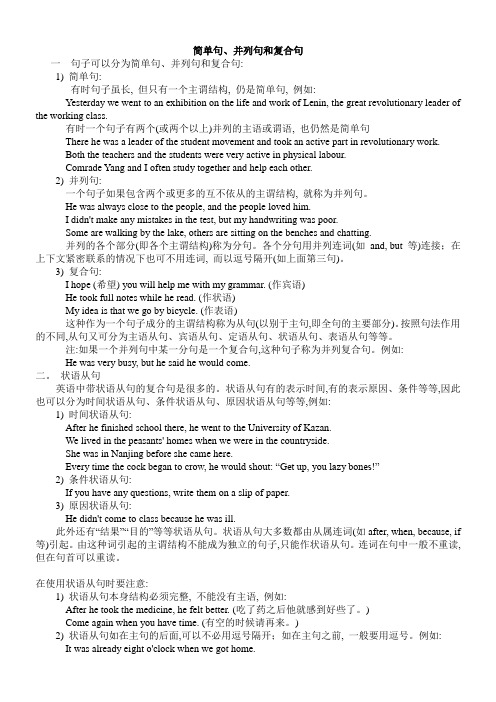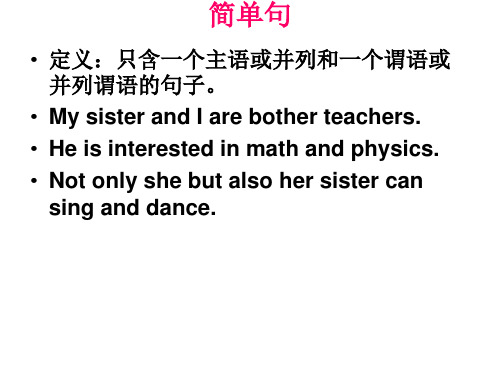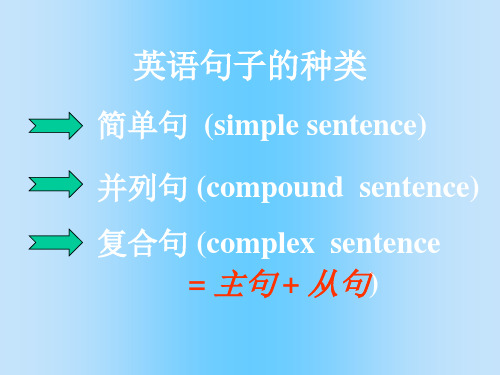简单句复合句并列句等
简单句,并列句,复合句

简单句、并列句和复合句一句子可以分为简单句、并列句和复合句:1) 简单句:有时句子虽长, 但只有一个主谓结构, 仍是简单句, 例如:Yesterday we went to an exhibition on the life and work of Lenin, the great revolutionary leader of the working class.有时一个句子有两个(或两个以上)并列的主语或谓语, 也仍然是简单句There he was a leader of the student movement and took an active part in revolutionary work.Both the teachers and the students were very active in physical labour.Comrade Yang and I often study together and help each other.2) 并列句:一个句子如果包含两个或更多的互不依从的主谓结构, 就称为并列句。
He was always close to the people, and the people loved him.I didn't make any mistakes in the test, but my handwriting was poor.Some are walking by the lake, others are sitting on the benches and chatting.并列的各个部分(即各个主谓结构)称为分句。
各个分句用并列连词(如and, but 等)连接;在上下文紧密联系的情况下也可不用连词, 而以逗号隔开(如上面第三句)。
3) 复合句:I hope (希望) you will help me with my grammar. (作宾语)He took full notes while he read. (作状语)My idea is that we go by bicycle. (作表语)这种作为一个句子成分的主谓结构称为从句(以别于主句,即全句的主要部分)。
简单句、并列句、复合句文档

简单句英语句型分类根据语法形式,即句子的结构,英语的句子可分为简单句、并列句和复合句。
基本形式简单句的基本形式是由一个主语加一个谓语构成。
其它各种句子形式都是由此句型发展而来,如五大基本句型:五大基本句型1.主语+谓语谓语一定是动词这种句型简称为主谓结构,其谓语一般都是不及物动词,例:Things change.事物是变化的。
Nobody went.没有人去。
--Did you go by sea?你们走的是海路吗?--NO,we flew.不,我们是飞去。
2.主语+连系动词+表语也叫做主系表这种句型称为主系表结构,其实连系动词在形式上也是一种谓语动词,但实质上表语成了谓语,例:Mr. Turner is an artist.特纳先生是位画家。
The milk went sour.牛奶变酸了。
She became a lawyer.她当了律师。
注:我们平常所说的be动词有两种含义:1、助动词的be;2、作为连系动词的be;3.主语+谓语+宾语宾语有两种:间接宾语和直接宾语这种句型可称为主谓宾结构,它的谓语一般多是及物动词,例:We never beat children.我们从来不打孩子。
My sister will fix everything.我姐姐会料理一切。
4主语+谓语+宾语+宾语这种句型可称为主谓宾宾结构,其谓语应是可有双宾语的及物动词,两个宾语一个是间接宾语,一个是直接宾语,例:He gave the book to his sister.他把这本书给了他的妹妹。
I'll write you a long letter.我将写给你一封长信。
5.主语+谓语+宾语+宾补所谓宾语补足语就是补充说明前面的宾语这种句型可简称为主谓宾补结构,其补语是宾语补语,与宾语一起即构成复合宾语,例:I found the book easy.我发现这本书不难。
(形容词easy作补语)I'll let him go.我将让他去。
简单句 并列句 复合句

1. 陈述句(Declarative Sentences)
用来说明一个事实或陈述一种看法。例如: 1) Light travels faster than sound.
光比声传播速度快。(说明事实) 2) The film is rather boring.
这部电影很乏味。(说明看法)
要特别注意陈述句的否定结构
6. 状语 ( Adverbial )
常指修饰动词、形容词或副词的成分,修饰动词时 表示动作发生的时间、地点、目的或方式等;修饰 形容词或副词时表示它们的程度等。状语常由副词、 介词短语、动词不定式或分词短语等充当。 例如: 1. The miners work very hard. 2. She often helps Mike at school. 3. Hearing the news, he couldn’t help jumping.
3. 宾语 ( Object )
常指及物动词或介词后面使之意思完整的词或短语。 常由名词、代词、动词不定式或动名词短语等充当。 例如: 1. She has finished doing the experiment. 2. We like English and are good at it.
4. 表语 ( Predicative )
5)主 + 动 + 间宾 + 直宾 例如: My mother made me a new dress. 我母亲给我做了一件新衣裳。
IV. 并列句的常用连词
1. 我们常用并列连词and, not only…but also…等 连接联合并列句,用not only…but also… 时, 前面一句要用部分倒装 。例如: 1)Use your head, and you’ll find a way. 2)Not only does he want to come, but the students also need him.
简单句并列句复合句

能连接并列复合句的副词
• besides 而且,还有 • hence 由此,因此 • nevertherless然而 • moreoever加之,因此 • otherwise 否则,要不然 • then 然后,于是 • therefore 因此,要不然 • then 然后,于是 • therefore因此,所以 • thus 因而,从而 • i am not feeling very well today, otherwise i would do
• 第四种句型: • 主语+动词+间接宾语+直接宾语 • 如:He brings me cookies every day. • They gave him a watch.
• 第五种句型: • 主语+动词+宾语+宾语补足语 • 如:He asked me to answer this question. • We often see him play basketball alone.
• 如:The old woman lives alone, but she never feels lonely.
• we love peace but we are not afraid of war.
第三种:表示选择关系
• 此类并列连词有or, otherwise, either…or…等。
• 第二种句型: • 主语+动词+宾语 • 如:He loves his wife.
• We will always remember the junior high school life.
• 第三种句型: • 主语+连系动词+表语 • 如:I am a winner. • The music sounds nice. • We are in the classmate.
简单句并列句复合句

基本句型 四
S │Vt │ o(多指人)│ O(多指物)
1. She │ordered │herself │a new dress. 2. She │cooked │her husband │a delicious meal3. He │bought │you │a dictionary. 4. He │ gave │ me │ some ink. 5.I │showed │him │my pictures. 6. I │gave │my car │a wash. 7. I │told │ him │that the bus was late. 8. He │showed │me │how to run the machine. 3. He bought a dictionary for you.
表语从句
• 5. What he said is different from what he did.
定语从句
• A famous scientist from Beijing gave us a talk yesterday. • A famous scientist who came from Beijing gave us a talk as soon as we came to school yesterday. • The boy who broke the window is called Tom. • The meal that / which my mother cooked was delicious.
复合句 (名词性从句,定语从句和状语从句)
• 由一个主句和一个或一个以上的从句构成, 主句为主体,从句不能独立,只作句子的 一个成分。
名词从句
• 1. I don‟t believe what he said. 宾语从句 • 2. What he said isn‟t true. 主语从句 • 3. I don‟t believe what he said, because what he said isn‟t true. • 4.The trouble is that they have no money.
高考英语语法复习 ---简单句并列句复合句

(武汉调研4月) Put yourself in situations where you will be forced to communicate in English, ___ you will see more progress over time. A. or B. so C. yet D. and (崇文4月) You must get up early in the morning, ___ we’ll have to leave without you A.and B. but C. or D. so
英语句子的种类
简单句 (simple sentence) 并列句 (compound sentence)
复合句 (complex sentence = 主句 + 从句)
简单句的五种基本句型
• 主语 + 不及物动词 ( S + Vi ) • 主语 + 及物动词 +宾语 ( S + Vt + O) • 主语 + 系动词 + 表 (S + LV + predicative) • 主语+双宾动词+间宾+直宾(S +Vt +O.indir+O. dir) • 主语 + 宾补动词 +宾语 +宾语补语 • (S + Vt. + O + O. compl) •There + be / stand/ lie / live...
其它平行结构:not…but…, either…or…, neither…nor, not only…but also…, would rather…than…(宁愿……不愿 ……), rather than(而不), as well as(既……也……)等。
简单句、并列句和复合句的区别
简单句、并列句和复合句的区别在英语中,句子根据句子结构可以分为:简单句、并列句和复合句。
你知道要怎么区别简单句、并列句和复合句吗?接下来,店铺跟你分享简单句、并列句和复合句的区别方法。
如何区分简单句、并列句和复合句简单句、并列句和复合句的区别一、简单句当一个句子只包含一个主谓结构时,我们称之为简单句。
The train(主语) has just touched down(谓语).在英语中,最基本的句型大体上有五种。
1. S+Vi:主语+不及物动词She sat down beside me.2. S+V+P:主语+系动词+表语Mother isn't in at the moment.3. S+Vt+O:主语+及物动词+宾语I hope to finish the work today.4. S+Vt+OI+OD:主语+及物动词+间接宾语+直接宾语My uncle gave me a camera.5. S+Vt+O+C:主语+及物动词+宾语+宾语补足语The news made us sad.备注:S:主语Vi:不及物动词Vt:及物动词O:宾语OD:直接宾语OI:间接宾语C:宾语补足语二、并列句两个或两个以上独立的主谓结构或简单句并列在一起,我们称之为并列句。
各个简单句间是平行并列的关系,而非从属关系。
并列句的各个分句间可用逗号、分号、起连接作用的副词或并列连接词来连接。
1. 能连接并列句的连词and(和,又),but(但是),for(因为),however(然而),or(或者),so(所以,因而),while(然而),yet(然而)2. 能连接并列句的复合连词or else(否则,要不然),either...or...(要么···,要么···;或者···,或者···),neither...nor...(既不···,也不···),not only...but also(不仅···,而且···)3. 能连接并列句的副词besides(而且,还有),hence(因此),otherwise(否则,要不然),then(然后,于是),therefore(因此,所以),thus(因而,从而) 根据并列分句之间的不同关系,并列句则可以分为以下四种。
英语句子类型(简单句、并列句、复合句)
a hat
yesterday.
The children ran
home.
Weቤተ መጻሕፍቲ ባይዱ
ate
our meal
in silence.
The car
stopped
suddenly.
并列句
• 由并列连词把两个或两个以上的简单句连接起来的句子叫 并列句。常见分类:
• 1.表示同等、平行或承接关系,常用连词有and, both...and...,not only...but also..., neither...nor...,as well as等。
She likes English. 3. 主语 + 系动词 +表语 (主语补语) She is happy. 4. 主语 + 双宾动词 + 间接宾语 + 直接宾语 She gave John a book.
She bought a book for me. 5. 主语 + 及物动词 + 宾语 + 宾补 She makes her mother angry.
to cancel the meeting.
• 结果: He was very angry, so that he left the room without saying a word.
• 目的: The teacher must speak clearly so that his students can understand well.
定语从句
英语中的定语是一个词时,放在被修饰词的前面, ①a beautiful girl ②a lovely boy (形容词作定语)
定语是两个以上的词组、短语或从句则放在被修饰词的后面, 如: ③She is the girl in red. (介词短语作定语) ④The lady carried a bag full of money. (形容词短语作定语) ⑤He is the man who you are looking for. (定语从句作定语)
简单句并列句复合句
简单句:(五种)
①主语+谓语(vi)
②主语+谓语(vt)+宾语
③主语+谓语(vt)+间接宾语+直接宾语
④主语+谓语(vt)+宾语+宾语补足语
⑤主语+系动词+表语
并列句:简单句+连接词+简单句
1、是指由两个或两个以上并列而又独立的简单句构成的句子,其中简单句由并列连词连在一起。
并列连词连接的简单句叫做分句。
复合句:含有一个或一个以上从句的句子。
复合句包含:名词性从句(主语从句、宾语从句、表语从句和同位语从句)、定语从句和状语从句等。
定语用来修饰名词或代词,对名词或代词起修饰、限定作用的词、短语或句子,汉语中常用'……的'表示,通常位于被修饰的成分前。
状语用来修饰v.,adj.,adv.,或句子。
表示时间、地点、原因、目的、结果、程度、条件、方式和让步。
简单句,并列句,复合句
十、简单句1、简单句的特点:简单句通常只由一个主语(或并列主语)和一个谓语(或并列谓语)构成。
2、简单句的种类:简单句一般分为陈述句、疑问句、感叹句和祈使句四种。
3、陈述句:用来说明一个事实的句子叫陈述句。
它有肯定式和否定式两种形式。
▲陈述句的肯定式:He is a middle school student.(他是个中学生)/ I have a hammer in my hand.(我手上有把锤子)/ She teaches us geography.(她教我们地理)/ The new play was good enough and everybody enjoyed it.(新的话剧非常好大家都喜欢)▲陈述句的否定式:1)谓语动词如果是be 、助动词、情态动词时,在它们的后面加“not”。
如:My brother is nota teacher.(我的弟弟不是教师)/ He does not have a cousin.(他没有堂兄弟)/ I will not go there tomorrow.(明天我不去那儿)/ My mother is not cooking a meal in the kitchen.(我母亲现在不在厨房里做饭)/ You must not make such mistakes again.(你不该再犯类似错误了)/ We haven’t discussed the question yet(我们还没有讨论那个问题呢).2)谓语动词如果没有上述词语而是其他动词时,须在它的前面加do not(don’t).如:I don’t know anything about it.(此事我一无所知) / Li Ming does not feed pigs in the countryside.(李明不在农村养猪)/ We didn’t expect to meet her right here.(我们没指望着在这里见到她)/ We didn’t have a meeting yesterday afternoon.(昨天下午我们没有开会)3)如果“have”作“有”讲,也可以在它后面加not构成否定式,其形式与have got的否定式相同。
- 1、下载文档前请自行甄别文档内容的完整性,平台不提供额外的编辑、内容补充、找答案等附加服务。
- 2、"仅部分预览"的文档,不可在线预览部分如存在完整性等问题,可反馈申请退款(可完整预览的文档不适用该条件!)。
- 3、如文档侵犯您的权益,请联系客服反馈,我们会尽快为您处理(人工客服工作时间:9:00-18:30)。
Simple Sentence 简单句一个主语+一个谓语动词1.The mother is dressing her baby.2.The party ended early.3.He lost his wallet last week.4.The city was destroyed by the earthquake.两个或多个主语+一个谓语动词5.Tom and Mary are sitting under the tree.6.Her speech and performance moved the audience.一个主语+两个或多个谓语动词7.He is reading and writing at the same time.8.The factory chimney smoked and polluted the air.两个或多个主语+两个或多个谓语动词9.Mike, Jack and Lucy lubricated my car, replaced the oil filter, and cleaned the spark plugs.Compound Sentences 并列句A compound sentence is made up of two or more simple sentences, usually connected by a comma plus a joining word (and, but, for, or, nor, so, yet). It is used when you want to give equal weight to closely related ideas. The technique of showing that ideas have equal importance is called coordination1. The heavy rain started suddenly, so we stopped planting our trees.2. Frank wanted to go swimming, but Mary decided to go shopping.3. Jane works at the Family Planning Clinic and her husband Smith does research work for the same unit.4. Mary had to give up sewing, for her arthritis had become very painful.(注意:for是并列连词,而because和since 为从属连词) .实际上,but, yet 和for之后的句子从语气上更引人注目.Practice: Combine the following pairs of simple sentences. Use a comma and a joining word (and, but, for, so) to connect each pair.1.I cleaned the spot on the kitchen floor. It still looked dirty.2.My son is studying computer science. My daughter is majoring in communication.3.We are watering the trees. We don’t have any rain for a month.4.The children started arguing. I made them turn off the TV.5.At midnight my roommate closed her books. I studied until 2AM.6.We must plan our family budget carefully. The price of food has risen recently.Complex Sentences 复合句A complex sentence is made up of a simple sentence (a complete statement) and a statement that begins with a dependent word. (连词) It is used when you want to emphasize one idea over another in a sentence.1. Because I forgot the time, I missed the play.2. While Susan was eating the fish, she began to feel sick.3. I checked my paper again before I handed it to my professor.4. When Cindy lost her temper, she also lost her manner.5. Although Tom practiced for two months, he failed his driving test.Practice A: Use appropriate dependent words to combine the following pairs of simple sentences into complex sentences. Place a comma after a dependent sentence when it starts the sentence.1.Jack obtained a credit card. He began spending money carelessly.2.The sun went down. We stayed on the beach.3.English is offered only in the morning. Chemistry can be taken at night.4.The movie disgusted the coach. He walked out after 15 minutes.5.The house had been burglarized. Smith couldn’t sleep soundly for several months.6.His vision begins to fade. He knows he’d better get some rest.7.The storm hit the coast city. We crisscrossed our windows with strong tape.Practice B: Rewrite the following sentences, using subordination rather than coordination. Includea comma when a dependent statement starts a sentence.1.The tape recorder was not working right, so I returned it to the store.2.The muffler shop advertised same-day service, but my car wasn’t ready for three days.3.The high-blood-pressure pills produced dangerous side effects, so the government bannedthem.4.David lopped dead branches off the tree, and Mike stacked them into piles on the groundbelow.5.Diana wedged her handbag tightly under her arm, for she was afraid of muggers.6.Richard counted the cash three times, but the total still didn’t tally with the amount on theregister tape.Practice C: Combine the following simple sentences into complex sentences. Omit repeated words. Use the dependent words who, which, or that.1.My father planted these apple trees three years ago. They have not borne any fruit.2.The boy was in a motorcycle accident. The boy limps.3.Joan is a champion weight lifter. Joan is my neighbor.4.The two screws were missing from the assembly kit. The two screws held the bicycle frametogether.5.The letter is from my friend abroad. The letter arrived today.6.The tall hedge muffled the highway noise. The hedge surrounded the house. Compound-complex Sentence 并列复合句The compound-complex sentence is made up of two (or more) simple sentences and one (or more) dependent statements.1.When the power line snapped, Jack was listening to the stereo, and Linda was reading in bed.2.After I returned to school following a long illness, the math teacher gave me make-up work,but the history teacher made me drop her course.Practice:Use coordination or subordination to combine the groups of simple sentences into one or more longer sentences. Omit repeated words. Keep in mind that, very often, the relationship among ideas in a sentence will be clearer when subordination rather than coordination is used.1.My car is not starting on cold mornings. I think the battery needs to be replaced. I already hadit recharged once. I don’t think it would help to charge it again.2.I needed butter to make the cookie better. I couldn’t find any. I used vegetable oil instead.3.Gena had worn glasses for 15 years. She decided to get contact lenses. She would be able tosee better. She would look more glamorous.4.The children at the day-care center took their naps. They unrolled their sleeping mats.5.Jack dialed the police emergency number. He received a busy signal. He dropped the phoneand ran. He didn’t have time to call back.6.Louis disliked walking home from the bus stop. The street had no overhead lights. It was linedwith abandoned buildings.7.The rain hit the hot pavement. Plumes of steam rose from the blacktop. Cars slowed to a craw.The fog obscured the driver’s vision.8.His car went through the automated car-wash. Harry watched from the sidelines. Floppybrushes slapped the car’s doors. Sprays of water squirted onto the roof.9.The pipes had frozen. The heat had gone off. We phoned the plumber. He couldn’t come fortwo days. He had been swamped with emergency calls.10.My car developed an annoying rattle. I took it to the service station. The mechanic lookedunder the hood. He couldn’t find what was wrong.。
